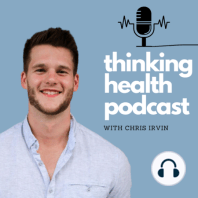72 min listen

S1E10: Brian Sanders - Debunking the Food Lies We’ve Been Told
S1E10: Brian Sanders - Debunking the Food Lies We’ve Been Told
ratings:
Length:
88 minutes
Released:
Oct 4, 2021
Format:
Podcast episode
Description
Brian Sanders is the filmmaker behind Food Lies, a top five nutrition podcast host of Peak Human, a health coach, and an international speaker who is on a mission to spread awareness on regenerative agriculture and increase accessibility to well-raised animal products. In this episode, Brian discusses what happened during a 40-year period that changed our food industry to this day, the problem with nutrition epidemiological studies, why a plant-based diet bias exists and how that’s negatively affecting us, why counting calories is ineffective and what to focus on instead, satiety signals, and so much more. You’ll also hear more about Brian’s documentary Food Lies and how this differs from other nutritional documentaries out there. Here’s a breakdown of the episode with The Ketologist Chris Irvin: 00:00 Chris’ introduction to the episode and Brian’s background 3:15 Where Brian likes to eat in Austin, TX 4:44 How Brian came up with his tagline for Food Lies 5:44 Brian’s approach in Food Lies 6:32 The science on ancestral nutrition principles and how it applies today 8:31 What happened during a 40-year period in our history that’s still impacting us today 12:20 Gary Taubes’ thoughts on what went wrong 13:28 Vitamin K activating vitamin D 13:55 The inherent problems with epidemiological studies 15:33 An interesting nutrition study on kids and obesity rates 17:00 The plant-based diet bias and why this exists and how it’s still being perpetuated today 18:57 Why are people continuing to use epidemiological studies if they have problems? 20:35 The impact of Big Food getting involved in our food system 23:15 How bad hospital food is nutritionally and why it’s like this 26:13 Why we’re in this mess 28:09 What can we do to fix this problem? 36:02 What’s the story with calories? 40:22 The satiety levels in food and why this should be more of a focus 44:39 Is it true that obese people have poor appetite signaling hormones? 48:51 The problem with counting calories 50:18 Protein satiety signaling 52:38 The difference between carbs and fats for satiety 55:11 Does the glycemic response and blood sugar play a role in satiety? 1:01:47 Why high omega-6 consumption and seed oils are two of the biggest problems 1:07:10 The problems with seed oils 1:08:00 Metabolic status and taking daily habits into consideration 1:12:39 More about Brian’s documentary Food Lies, including why he started this project, what he hopes to achieve with it, and more 1:15:05 What would success look like for his documentary? 1:20:26 Brian also shares whether he’s been censored on social media for his work on his documentary 1:25:12 How you can support Brian’s work and his documentary Food Lies Resources mentioned in this episode: Brian Sander’s Food Lies website Brian’s Instagram, YouTube, Twitter, and Facebook Brian’s Nose to Tail company The book Brian mentioned in the episode, Nutritional & Physical Degeneration, by Weston Price The article Chris mentioned in the episode: Game Changers Movie Review: Fact vs. Fiction
Released:
Oct 4, 2021
Format:
Podcast episode
Titles in the series (61)
S1E15: L.J. Amaral - Using Keto for Cancer Treatment by Thinking Health Podcast